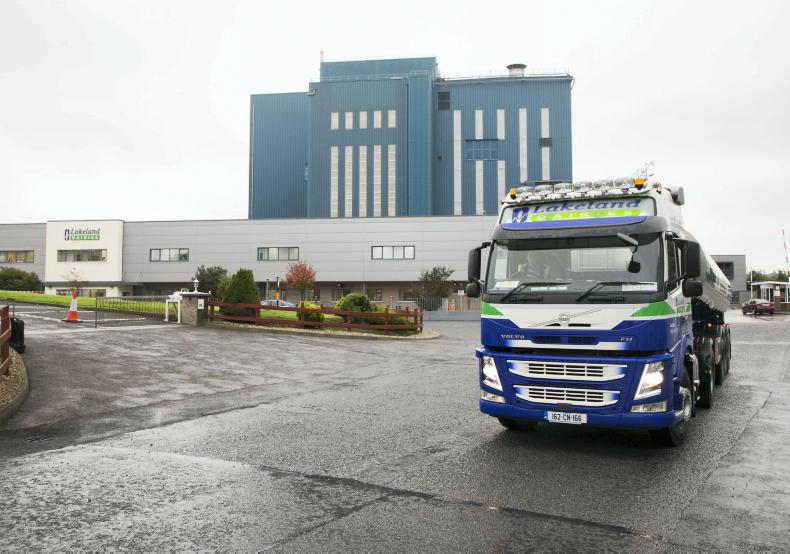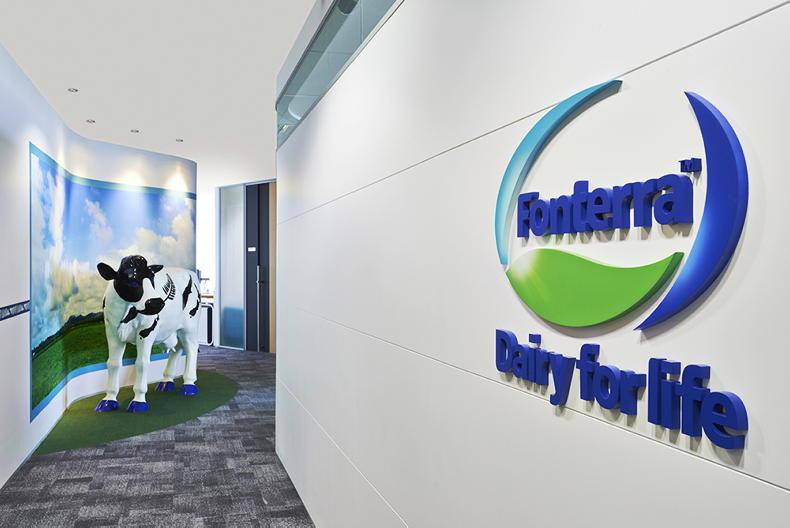The value of facts and real measurement often seems to be forgotten when commercial interests are intertwined. To some extent, you can understand that businesses are attempting to look around the corner and offset potential Brexit losses or higher costs that may be coming down the line. However, when it comes at the expense of individual farmers who are trying to deal with current stocks and financial strains, we need to be crystal clear on the impacts and realise it can’t always be the individual farmer that takes the hit.
This week we see clear impacts on three very different but linked farming sectors: farm families, the dairy sector and finally the beef sector. Let’s take them one by one.
Farm families
Brexit has been blamed by Minister of State for Mental Health and Older People Jim Daly for the delay in giving the green light to reducing nursing home charges on farm families.
Under the Government proposal, the value of a farm or other small business asset should be taken out when means-testing for the Fair Deal Scheme if its owner has been in a nursing home for three years and if a family member commits to taking over the farm. Unfortunately, this proposal hasn’t been moved on since last July. The longer this departmental inaction goes on, the more and more farm families are losing out.
Dairy
The fundamentals of dairy markets are strong. On the supply side, early European supply is down and New Zealand supply is not going to be as great as expected.
Demand from China and Asia in general is very strong. Given currency movements, European product is now more competitive. Yet as seasonal Irish producers head for peak milk supply, milk prices to farmers have been cut. The only real uncertainty in the market is the Brexit question and processors use this as the main reason for taking millions from dairy farmers. These and further price cuts seem unjustified if market signals are to be believed.
Beef
The third and most heavily impacted sector is beef. The obvious frustration being felt boiled over at the IFA Laois meeting this week. Farmers speaking from the floor described a situation where top performance coupled with the best of efficiencies are met with factory agents telling them month after month that the market situation would improve. This type of attitude no longer works with farmers, especially beef farmers who have been finishing cattle on expensive indoor diets for no margin or negative margins for the last three years.
The days of investing on a whim and prayer are long gone. What is needed immediately is a significant price rise in factories
To give credit where it is due, the Government and Bord Bia have been working hard to develop markets beyond the EU. To an extent they are delivering for the dairy and the pig sectors. Progress has been much slower for beef yet there is a huge opportunity in strong Asian economies, particularly China, Japan and South Korea if we could obtain export approval. Japan is on the road to reduced tariffs since February and Liffey Meats joined six other Irish beef factories in getting Chinese approval this week. When the further 12 factories going through the approval process get clearance, we can expect meaningful sales there too.
While these are markets in the early stage of development, the US has been open for business since 2015 and yet Irish exports have been disappointingly slow. There were issues at the outset getting manufacturing beef approved in the absence of the liberal use of lactic acid which took over a year to resolve. With a testing procedure now in place and a deficit of manufacturing driving import prices upwards, as well as a US cattle price 30c/kg ahead of Ireland, surely Irish exports can take a bigger slice of the market than the 1,204t supplied in the first quarter of this year.
It is clear that global markets are strong and China’s problem with African swine fever will create massive demand across global meat supplies, as Lorcan Allen reports.
So, what does it mean for farmers? The frustration was palpable at the Fair Deal protest march in Dublin on Tuesday and the beef meeting in Laois. Farmers need real action if we expect them to continually invest in restocking and purchasing inputs. The days of investing on a whim and prayer are long gone. What is needed immediately is a significant price rise in factories and the successful pursuit of retrospective market compensation. If both materialise, the mood among farmers would quickly improve.
Beef: frustrations to the fore at Galway suckler meeting
The North East Galway Beef Producer Group has been in operation for 20 years and has 130-140 members, mainly consisting of committed suckler farmers. It was disappointing at their meeting this week to see the extent to which these farmers are disenfranchised with Teagasc and ICBF. There was a feeling that knowledge transfer groups had failed farmers with few learnings and any financial gain harvested by Teagasc through facilitation fees.
There was repeated criticism of ICBF, particularly in relation to the Beef Data and Genomics Scheme (BDGP) and the Beef Environmental Efficiency Pilot (BEEP). While it is not surprising that schemes that are trying to change deep-rooted practices will face challenge, many of the points raised were valid, particularly in relation to changes in star ratings and the impact on the compliance with BDGP.
The ICBF needs to be engaging with such groups to address these issues. A national breeding programme without farmer commitment will deliver little in the way of genetic gain. With a heavy reliance on CAP in underpinning income, the view from the floor was very much one of disappointment and frustration in relation to the withdrawal of support for the suckler cow.
The need for a strong coupled payment was widely accepted with the front-loading of payments an attractive option. However, what was once again clear was the extent to which views had been formed on certain aspects of the CAP in the vacuum of information. One very clear message was that beef farmers wanted to know the extent to which support for the suckler and beef sector had declined in the past decade – something the Department of Agriculture should be in a position to easily clarify should there be a desire.
There was also extreme frustration among a number of “forgotten farmers” towards farm organisations and the Department for failing to act on the European Commission’s ruling that they were entitled to retrospective payments. The progression and development of these young farmers has been impacted by a lack of political will to deal with this issue. A solution for past anomalies in the Young Farmer Scheme needs to be made a priority.
Nutrition: Omega holy grail?
Omega 3 amino acids, found mainly in oily fish, but also in grass-fed beef and lamb, are particularly valuable for brain development. Several efforts have been made over the last 50 years to develop an economic model of harvesting Omega 3 fatty acids from algae. So far, none has worked, although Devenish has used marine algae as a component for broiler feed with positive results for the broilers and the humans eating them.
At the Forum for the Future of Agriculture conference, Heather Mills correctly said that fish consumed plankton and produced Omega 3 fatty acids. She then claimed that her company had cracked the challenge of extracting Omega 3 directly from algae and so direct supplementation to people would now be possible. This is a remarkable claim and, if true, has the potential to transform human nutrition.
We need good, peer-reviewed research to test Mill’s assertion.
Sugar: EU crisis casts shadow on beet industry
The folly of Europe abandoning all restraints on the importation of sugar from third countries is now evident. The continental sugar industry is in crisis with plants closing in France and Germany. Processors’ profits have collapsed and the future of the beet sector in Europe is open to question.
While the sugar beet breeding programmes have been successful, the sector cannot compete with sugar cane from subtropical parts of Australia and Brazil.
This crisis in the European sugar sector must put a question mark over the plans to revive an Irish sugar beet industry – despite the sincerity and hard work of the promoters.
The value of facts and real measurement often seems to be forgotten when commercial interests are intertwined. To some extent, you can understand that businesses are attempting to look around the corner and offset potential Brexit losses or higher costs that may be coming down the line. However, when it comes at the expense of individual farmers who are trying to deal with current stocks and financial strains, we need to be crystal clear on the impacts and realise it can’t always be the individual farmer that takes the hit.
This week we see clear impacts on three very different but linked farming sectors: farm families, the dairy sector and finally the beef sector. Let’s take them one by one.
Farm families
Brexit has been blamed by Minister of State for Mental Health and Older People Jim Daly for the delay in giving the green light to reducing nursing home charges on farm families.
Under the Government proposal, the value of a farm or other small business asset should be taken out when means-testing for the Fair Deal Scheme if its owner has been in a nursing home for three years and if a family member commits to taking over the farm. Unfortunately, this proposal hasn’t been moved on since last July. The longer this departmental inaction goes on, the more and more farm families are losing out.
Dairy
The fundamentals of dairy markets are strong. On the supply side, early European supply is down and New Zealand supply is not going to be as great as expected.
Demand from China and Asia in general is very strong. Given currency movements, European product is now more competitive. Yet as seasonal Irish producers head for peak milk supply, milk prices to farmers have been cut. The only real uncertainty in the market is the Brexit question and processors use this as the main reason for taking millions from dairy farmers. These and further price cuts seem unjustified if market signals are to be believed.
Beef
The third and most heavily impacted sector is beef. The obvious frustration being felt boiled over at the IFA Laois meeting this week. Farmers speaking from the floor described a situation where top performance coupled with the best of efficiencies are met with factory agents telling them month after month that the market situation would improve. This type of attitude no longer works with farmers, especially beef farmers who have been finishing cattle on expensive indoor diets for no margin or negative margins for the last three years.
The days of investing on a whim and prayer are long gone. What is needed immediately is a significant price rise in factories
To give credit where it is due, the Government and Bord Bia have been working hard to develop markets beyond the EU. To an extent they are delivering for the dairy and the pig sectors. Progress has been much slower for beef yet there is a huge opportunity in strong Asian economies, particularly China, Japan and South Korea if we could obtain export approval. Japan is on the road to reduced tariffs since February and Liffey Meats joined six other Irish beef factories in getting Chinese approval this week. When the further 12 factories going through the approval process get clearance, we can expect meaningful sales there too.
While these are markets in the early stage of development, the US has been open for business since 2015 and yet Irish exports have been disappointingly slow. There were issues at the outset getting manufacturing beef approved in the absence of the liberal use of lactic acid which took over a year to resolve. With a testing procedure now in place and a deficit of manufacturing driving import prices upwards, as well as a US cattle price 30c/kg ahead of Ireland, surely Irish exports can take a bigger slice of the market than the 1,204t supplied in the first quarter of this year.
It is clear that global markets are strong and China’s problem with African swine fever will create massive demand across global meat supplies, as Lorcan Allen reports.
So, what does it mean for farmers? The frustration was palpable at the Fair Deal protest march in Dublin on Tuesday and the beef meeting in Laois. Farmers need real action if we expect them to continually invest in restocking and purchasing inputs. The days of investing on a whim and prayer are long gone. What is needed immediately is a significant price rise in factories and the successful pursuit of retrospective market compensation. If both materialise, the mood among farmers would quickly improve.
Beef: frustrations to the fore at Galway suckler meeting
The North East Galway Beef Producer Group has been in operation for 20 years and has 130-140 members, mainly consisting of committed suckler farmers. It was disappointing at their meeting this week to see the extent to which these farmers are disenfranchised with Teagasc and ICBF. There was a feeling that knowledge transfer groups had failed farmers with few learnings and any financial gain harvested by Teagasc through facilitation fees.
There was repeated criticism of ICBF, particularly in relation to the Beef Data and Genomics Scheme (BDGP) and the Beef Environmental Efficiency Pilot (BEEP). While it is not surprising that schemes that are trying to change deep-rooted practices will face challenge, many of the points raised were valid, particularly in relation to changes in star ratings and the impact on the compliance with BDGP.
The ICBF needs to be engaging with such groups to address these issues. A national breeding programme without farmer commitment will deliver little in the way of genetic gain. With a heavy reliance on CAP in underpinning income, the view from the floor was very much one of disappointment and frustration in relation to the withdrawal of support for the suckler cow.
The need for a strong coupled payment was widely accepted with the front-loading of payments an attractive option. However, what was once again clear was the extent to which views had been formed on certain aspects of the CAP in the vacuum of information. One very clear message was that beef farmers wanted to know the extent to which support for the suckler and beef sector had declined in the past decade – something the Department of Agriculture should be in a position to easily clarify should there be a desire.
There was also extreme frustration among a number of “forgotten farmers” towards farm organisations and the Department for failing to act on the European Commission’s ruling that they were entitled to retrospective payments. The progression and development of these young farmers has been impacted by a lack of political will to deal with this issue. A solution for past anomalies in the Young Farmer Scheme needs to be made a priority.
Nutrition: Omega holy grail?
Omega 3 amino acids, found mainly in oily fish, but also in grass-fed beef and lamb, are particularly valuable for brain development. Several efforts have been made over the last 50 years to develop an economic model of harvesting Omega 3 fatty acids from algae. So far, none has worked, although Devenish has used marine algae as a component for broiler feed with positive results for the broilers and the humans eating them.
At the Forum for the Future of Agriculture conference, Heather Mills correctly said that fish consumed plankton and produced Omega 3 fatty acids. She then claimed that her company had cracked the challenge of extracting Omega 3 directly from algae and so direct supplementation to people would now be possible. This is a remarkable claim and, if true, has the potential to transform human nutrition.
We need good, peer-reviewed research to test Mill’s assertion.
Sugar: EU crisis casts shadow on beet industry
The folly of Europe abandoning all restraints on the importation of sugar from third countries is now evident. The continental sugar industry is in crisis with plants closing in France and Germany. Processors’ profits have collapsed and the future of the beet sector in Europe is open to question.
While the sugar beet breeding programmes have been successful, the sector cannot compete with sugar cane from subtropical parts of Australia and Brazil.
This crisis in the European sugar sector must put a question mark over the plans to revive an Irish sugar beet industry – despite the sincerity and hard work of the promoters.









SHARING OPTIONS